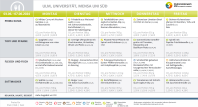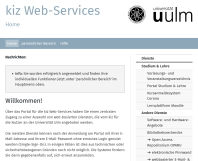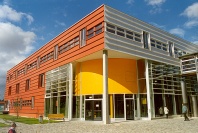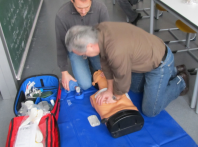Once again in the top ten most popular universities in Germany!
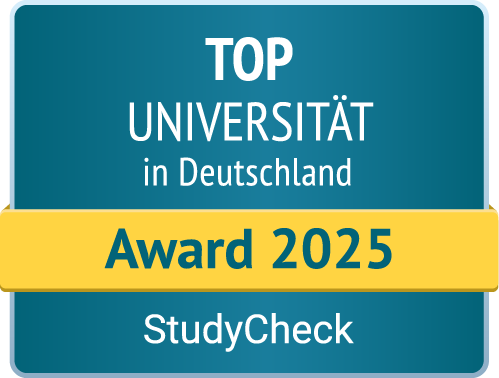
Ulm University climbs to 7th place in the StudyCheck ranking
The university evaluation portal StudyCheck has recognised Ulm University as a "Top University in Germany 2025" award. In a comparison of all universities, Ulm University is ranked 7th in Germany, improving its ranking by three places. Overall, the University achieved a score of 8.77 out of 10 possible points in the student evaluations.
Examination Regulations (FSPO)
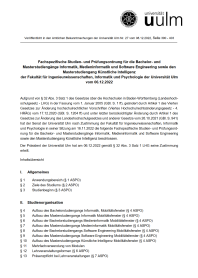
The rules for your (German) degree programme are defined in the subject-specific study and examination regulations (in German: Fachspezifisache Prüfungsordnung, short FSPO) and the general study and examination regulations (in German: Allgemeine Studien- und Prüfungsordnung, short ASPO). You should read and understand both documents as they define your obligations within the study programme, e.g. deadlines for obtaining credits. The FSPO is supplemented by a description of the study programme in the study plan and the description of the modules with their learning content in the module handbook.
Information for students of the FSPO 2021 can be found here.
Campusonline
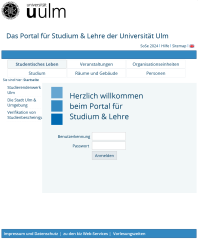
Campusonline is the university's central campus management system. Here you will find important information about your studies, such as study plans, module handbooks, the course catalog, courses and room allocations. You can use Campusonline to register for examinations and view your examination results as well as download study certificates or the transcript of records.
Study Plan
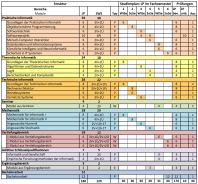
The study plan recommends a sequence for the modules to be completed. All modules from the compulsory area (C, in German: Pflichtbereich, short P) must be completed. Modules can be selected from the compulsory elective area (CE, in German: Wahlpflichtbereich, short WP) and the supplementary area (S, in German: Ergänzungsbereich, short: E). The supplementary area contains modules that are not part of the core study programme. A minimum number of credit points (CP) must be earned in the elective areas. However, the actual number may be higher. This is referred to as over-fulfilment.
Credit points indicate the average workload. An effort of 30 hours is assumed per credit point. The total workload per module is divided between the classroom hours in courses, preparation and follow-up work and preparation for examinations. The classroom hours are given in weekly semester hours (WSH, in German: Semesterwochenstunden, short SWS). This is the respective number of hours per week in the semester. Modules can consist of several kinds of components, e.g., lectures (L, in German: Vorlesung, short V), Exercises (E, in German: Übung, short Ü), projects (P, in German: Projekte, short Pj), seminars (S, in German: Seminare, short S) or tutorials (in German: Tutorien, short T).
Module Handbook (MHB)
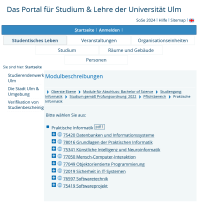
Like the study plan, the module handbook (MHB) is divided into sections and describes all current compulsory and elective modules, irrespective of the semester: What content is taught; what competences are to be acquired; which components the module consists of; how the modes of the examination; the cycle in which the courses take place.
You can find the specific courses on offer for a particular semester and information on when and where a course is offered in the current timetable.
Current Timetable
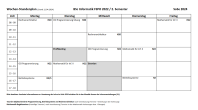
The current timetable provides an overview of the compulsory and compulsory elective courses in a semester and their course times. It is based on the study plan and is compiled for several study/degree programmes at the same time. Please check whether a course can be selected in your study/degree programme in the module handbook. The timetables for the current semester and possibly the planning for the coming semester are linked on the right or below.
How to Plan Your Studies
It is best to start with the study plan, which already recommends which modules to take in which semesters. The module handbook will tell you which courses you may attend. Courses usually have the same name as the module, but not always. In the Campusonline portal you will not only find the module handbook, but also the current course overview. It is best to log in with your kiz account and select the appropriate semester in the top right-hand corner. Under the Courses tab, select Course Overview, then the Faculty of Engineering, Computer Science and Psychology and then Informatik (Computer Science). For the courses listed there, you will find more detailed information, such as the lecturer's website, a link to the Moodle course and the course time and room. The current timetable will also help you to find this information.
In compulsory elective areas, please note that courses are usually only offered in the winter or summer semester. There may also be deviations due to semesters of leave, appointments, illness, etc. For courses offered at irregular intervals, it is not possible to predict when they will be offered. The respective cycle can be found in the module handbook.
Examinations
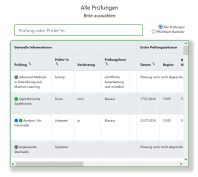
You will receive the credit points for a module after passing the (partial) examinations of the module. The module description specifies possible forms of examination, e.g. a written examination, an oral examination, a term paper or a project with written report and oral presentation of the results. In the department of Computer Science, the specific structure of the examinations in a semester can be found in the examination planning system. Times, rooms and permitted aids are specified there. For written examinations, you must register in the Campusonline system at least five days before the examination. For oral examinations, you must also register there and then arrange the examination date with your examiner.
Seminars and Seminar Registration
Scientific and methodological skills are developed in the seminars. Seminar places for the topics offered are allocated centrally in Moodle before the start of each semester. Detailed information can be found on the overview pages for seminars.
Theses
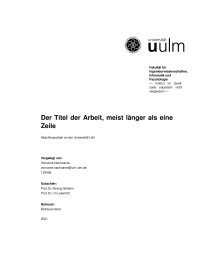
The aim of the thesis is to show that you can work independently in an academic environment. The Bachelor's thesis can be completed either in 9 weeks full-time or in 6 months during the course of study. The Master's thesis is always 6 months full-time. Theses may only be issued by the university. Theses in co-operation with companies are possible in principle, but often require a lot of coordination and should therefore be planned well in advance. Bachelor's theses have one examiner; Master's theses have two. One examiner must be from the Computer Science department at Ulm University! The second examiner of the Master's thesis can also come from other universities or research institutions in consultation with the examination board.
Seek dialogue with the staff of the institute you are interested in in good time (approx. 3 months before you wish to register). Discussions with lecturers about possible topics often arise in seminars or projects, but also in lectures from the specialisation area. In addition, most institutes offer a website with an overview of topics (see links in the right-hand column) or an information event per semester to which all interested parties are invited.
The thesis is registered by the signatures of the examiners and the students on an application for admission. Your supervisor will guide you through this process.
Thesis Topics of the Institutes
- Databases and Information Systems (DBIS)
- Embedded Systems/Real-Time Systems (ES)
- Artificial Intelligence (KI)
- Media Informatics (MI)
- Neural Information Processing (NI)
- Software Engineering and Programming Languages (SP)
- Theoretical Computer Science (Theo)
- Distributed Systems (VS)
Admission Bachelor's Thesis (German)
Admission Master's Thesis
Template for Theses
Study Period Abroad
All important information on going abroad can be found at the International Office. Due to the more flexible recognition options, a stay abroad is best planned in study periods with many elective courses. In the Bachelor's program, the planned mobility window is therefore in the 5th semester. The Master's programme consists mainly of elective modules, so a stay abroad can be integrated flexibly.
Important: Due to the long lead time, please inform yourself at least one year before your planned stay abroad!
Transition from Bachelor to Master
Towards the end of your Bachelor's degree, you can already complete the first modules for a Master's degree course. If a module for the Master's degree can also be taken in a compulsory elective area in your Bachelor's degree, you can overfulfill the corresponding compulsory elective area, i.e. take more credits than required. As soon as you are enrolled in the Master's program, this module can then be transferred. However, the compulsory elective area in the Bachelor's degree must still have the required number of credit points, as double assignment in the Bachelor's and Master's degree is not possible. If a module for the Master's degree cannot be selected in a compulsory elective area of the Bachelor's degree, use the supplementary area for allocation. You must then overfulfill the supplementary area analogously. If the desired module is not yet assigned to the supplementary area, clarify in advance whether an assignment is possible at all. To do this, fill out an application for allocation. The respective student advisory service will be happy to help you with specific questions.
Campusonline

Campusonline is the university's central campus management system. Here you will find important information about your studies, such as study plans, module handbooks, the course catalog, courses and room allocations. You can use Campusonline to register for examinations and view your examination results as well as download study certificates or the transcript of records.
Moodle
Moodle is the university's central learning platform. For each course, you will find lecture and exercise documents, announcements and also exercise submissions via Moodle. Links to the Moodle courses are announced in the lectures, are stored in Campusonline or can be found via the Moodle search.
Examination Planning System (PPS)

Examinations are planned over the course of a semester. For examinations in the department of computer science, the necessary information such as the type of examination, time, permitted aids or the rooms will be communicated in good time via the examination planning system (in German: Prüfungsplanungssystem, short PPS). Please make sure that the current semester is set (selection top right) and note that examination registration must be done via Campusonline.
Study Planner

In order to simplify study planning, students have developed a web application as part of a software engineering project. The usage is explained the first time you call the study planner. The data is collected from Campusonline (without an official interface). If information is therefore not up to date or cannot be found, you are welcome to use the feedback option provided.
Study Planner (in German)
Student Assistant Jobs
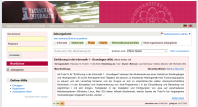
You can find and apply for student assistant positions directly via the student assistant job platform (HiWiBörse) called Convenda.
Study Management and Study Credits
Students of the examination regulations 2022 must complete 10 test subject hours (10 study credits) as part of the compulsory module "Empirische Forschugsmethoden der Informatik (EFI)". Studies that are remunerated with test subject hours in the Department of Computer Science are managed via the SONA system. Students can view all the studies offered in SONA and register for any studies they wish. After successful participation, the test subject hours earned are recorded in the system. Anyone who no longer needs test subject hours can also register for studies in which participation is (alternatively) financially remunerated via SONA.
To find your way around SONA, please read the relevant manual.
StudienLernWerkstatt (Learning to Study)
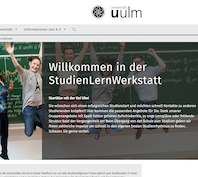
The StudienLernWerkstatt offers numerous support programmes that build a valuable bridge between school and university, especially in the introductory phase, and ensure a successful start to your studies. In computer science in particular, you will find offers such as "Getting Started with Programming" (in German: Programmierstarthilfe, short PSH), MathLab or special revision courses (in German: Repetitorien) to repeat the lecture material and prepare for exams.
Lukengast - Study Room Finder
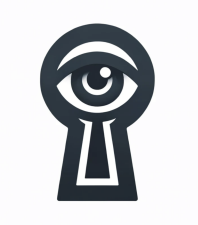
Are you and your study group looking for a free seminar room? With Lukengast, the service group informatics (SGI) offers a service to view the current availability of seminar rooms.
Campus-Navigator - Orientation on the Campus
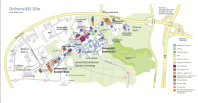
The Campus-Navigator gives you an overview of the entire university campus. With the lecture hall finder, you can not only find lecture halls on campus, but also PC pools, seminar rooms and printer locations.
Mailing Lists
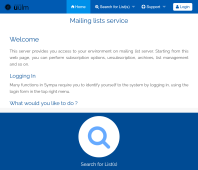
At the university, a lot of information is still distributed by e-mail. In the mailing list portal, you can see which mailing lists you are subscribed to and also subscribe to many other lists. This keeps you informed about various topics. In some lists you are automatically a subscriber (e.g. all students of a department). Information sent via these mailing lists is usually really important and should be heeded in any case. Make sure that you can read emails sent to your university address.
Service Group Informatics (SGI)
The SGI operates and maintains all computer facilities used for teaching in the Faculty of Computer Science and operates services such as the Student Assistant Job portal.
Student Administration and Examinations Office
The Student Administration and Examinations Office (in German: Studiensekretariat) manages students' examination files. It provides advice on topics such as re-registration, changing degree programs, semesters off, examination registrations and tuition fees. Completed theses must be handed in to the Student Administration and Examinations Office at the end of the degree course.
Study Commission
A study commission consists of professors, academic staff and students and deals with the further development of the content of the degree programs and the approval of financial resources for teaching. The commission also decides on module assignments. There is a web form for applying for module assignments in your degree program. The commission is chaired by the Dean of Studies.
The Study Commission Computer Science is responsible for the degree programs Informatik (BSc&MSc), Künstliche Intelligenz (MSc), Medieninformatik (BSc&MSc) and Software Engineering (BSc&MSc). The Study Commission Cognitive Systems is responsible for the MSc Cognitive Systems.
Prof. Dr. Birte Glimm
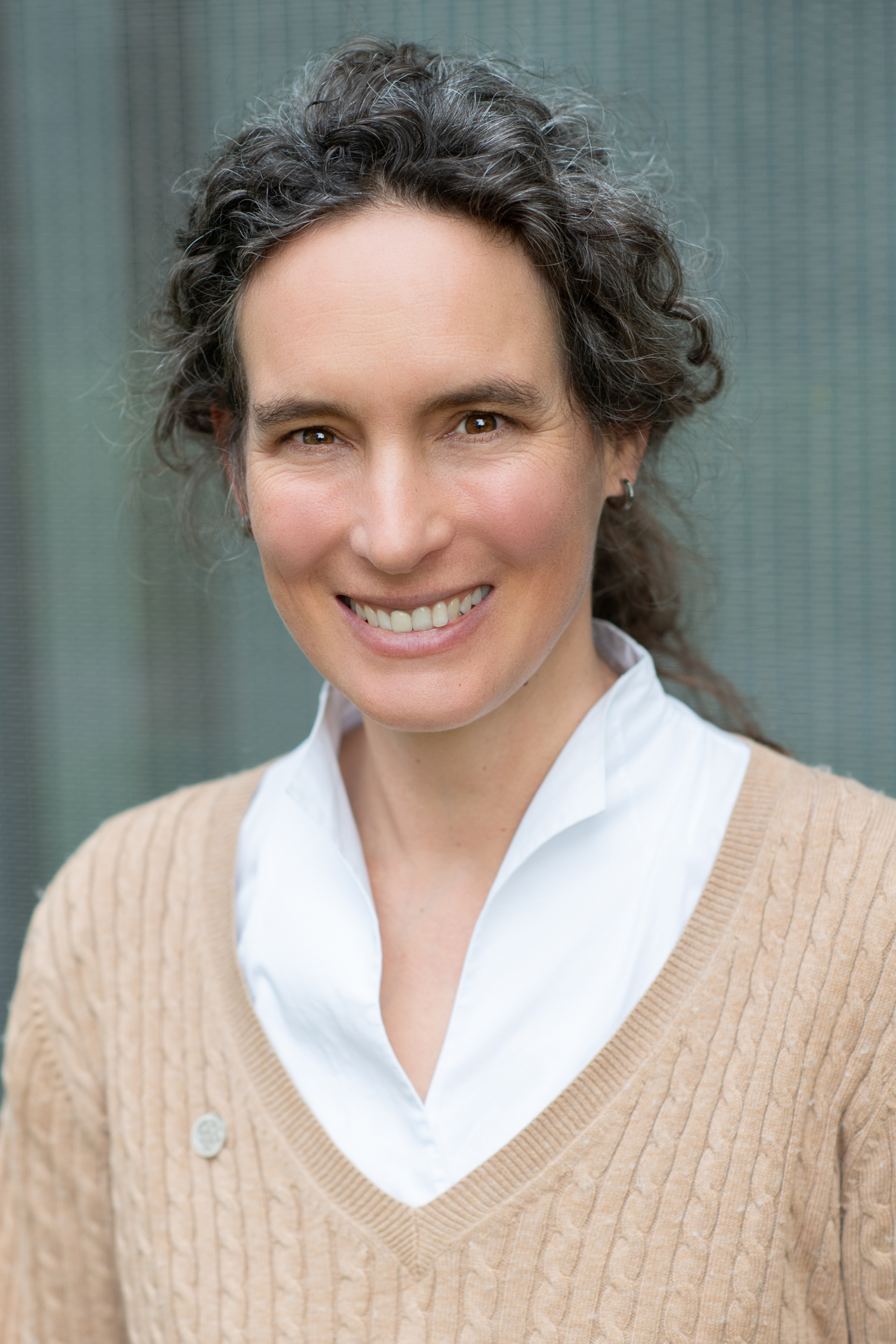
Examination Board
Examination boards are responsible for all examination matters in the degree program. Typical concerns are deadline extensions, recognition of academic achievements, compensation for disadvantages and learning agreements. Within Computer Science, the Examinations Board Cognitive Systems is responsible for the MSc Cognitive Systems, while the other study programs are handled by the Examination Board Computer Science
Prof. Dr. Enno Ohlebusch
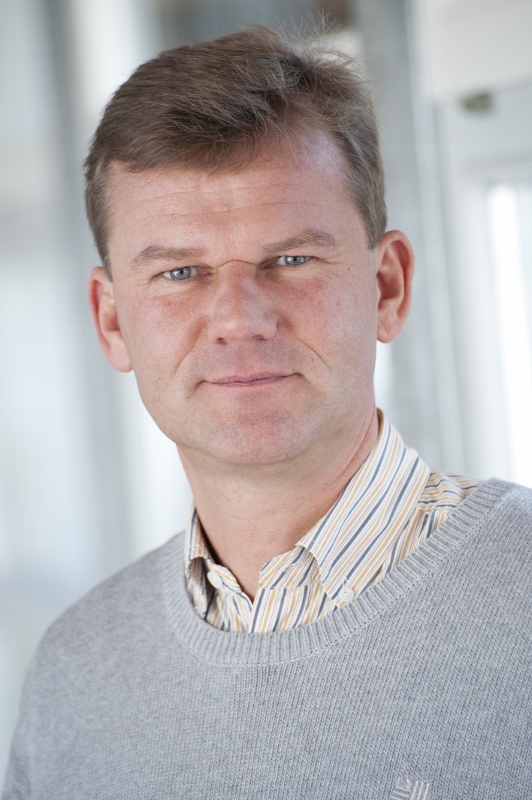
Study Advisor
The Study Advisor helps with content-related questions about the subject, e.g. structure and content, but also with a planned change of degree program. In contrast to the Central Student Advisory Service, the Study Advisor is responsible for questions that are predominantly subject-specific.
Dr. Markus Maucher

Communication and Information Center (kiz)
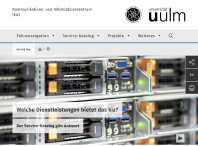
The kiz hosts the university's computer center. It operates many important services for you, such as Campusonline, Moodle, e-mail or lecture recordings, which you can access with your kiz account. The kiz also operates the library and the network with WLAN, for example. The kiz provides computer pools and printing services. You can find an overview of the services offered in the service catalog.
Computer Science Student Council (FIN)

The Computer Science Student Council (in German: Fachschaft Informatik, short FIN) represents the students of computer science-related degree programs. It is formed by students who are committed to student interests in the department and are happy to welcome new members.
International Office
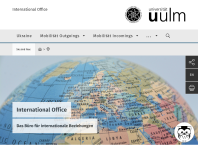
Would you like to spend a semester or a year abroad during your studies and acquire intercultural skills as well as subject-specific knowledge? The International Office will be happy to help.
Central Student Advisory Services (ZSB)
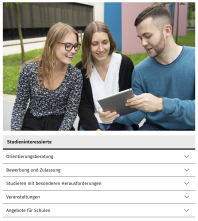
The Central Student Advisory Services (ZSB) help with general information needs or problems during your studies. The ZSB supports you on site, by telephone, video conference or e-mail during the difficult phases of your studies and during the transition period between studying and working.
Psychosocial Counseling Service (PBS)
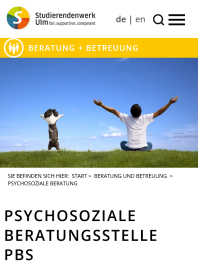
The PBS offers students competent advice and help in solving psychosocial problems and issues in individual counseling sessions (in German or English). The PBS advises you individually on learning difficulties, exam anxiety, personal problems and difficulties in your studies and everyday life.
Studierendenwerk

The Studierendenwerk Ulm (student services) takes care of issues such as food and drink (mensa, canteen, cafeterias), student grants and other financial matters, accommodation as well as advice and support.
Emergencies/Central Control Room
Is there a medical or other emergency? Dial 112 (without area code) directly!
The central control room is responsible for monitoring the building's technical systems and receiving general fault reports by telephone. The control room can be reached around the clock on 22225 and in emergencies on 22222.
Emergencies Phone 112
Fault Report Phone 22225
Central Control Room
Working as Student Assistant

The Department of Computer Science offers a variety of positions for student assistants each semester, including teaching (such as tutorials, support with exercises, revision courses) and research as well as administrative tasks (such as server support, application development).
Job offers can be found in the student job portal (Convenda, Hiwibörse), while general information such as hourly wages and recruitment modalities are available on the Human Resources website.
Humboldt Centre for Philosophy and Humanities (HZ)
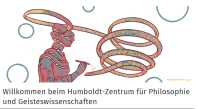
The HZ offers students of all subjects the opportunity to look beyond their subject area and to question their own thinking and actions critically and interdisciplinarily.
Centre for Languages and Philology (ZSP)
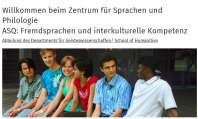
In the area of foreign languages and intercultural competence, the ZSP is dedicated to deepening and expanding foreign language skills and developing intercultural competence.
Music Centre (MUZ)

The MUZ organizes concerts, performances, exhibitions and much more, including art lectures, performances and readings. In addition, it offers opportunities such as an arts studio, sound studio, photo lab, improvisational theater, ballet, experimental music and art as well as a writing workshop to engage in activities outside your field of study.
University Sports (HSSP)
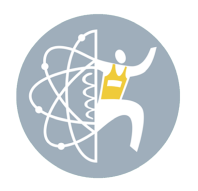
In addition to its own fitness studio (UNIFit), HSSP offers a wide range of sports, including ball sports, martial arts, fitness, dancing, mountain sports and more. In addition, courses are also offered to promote mental health in order to better cope with the stresses of everyday university life.

